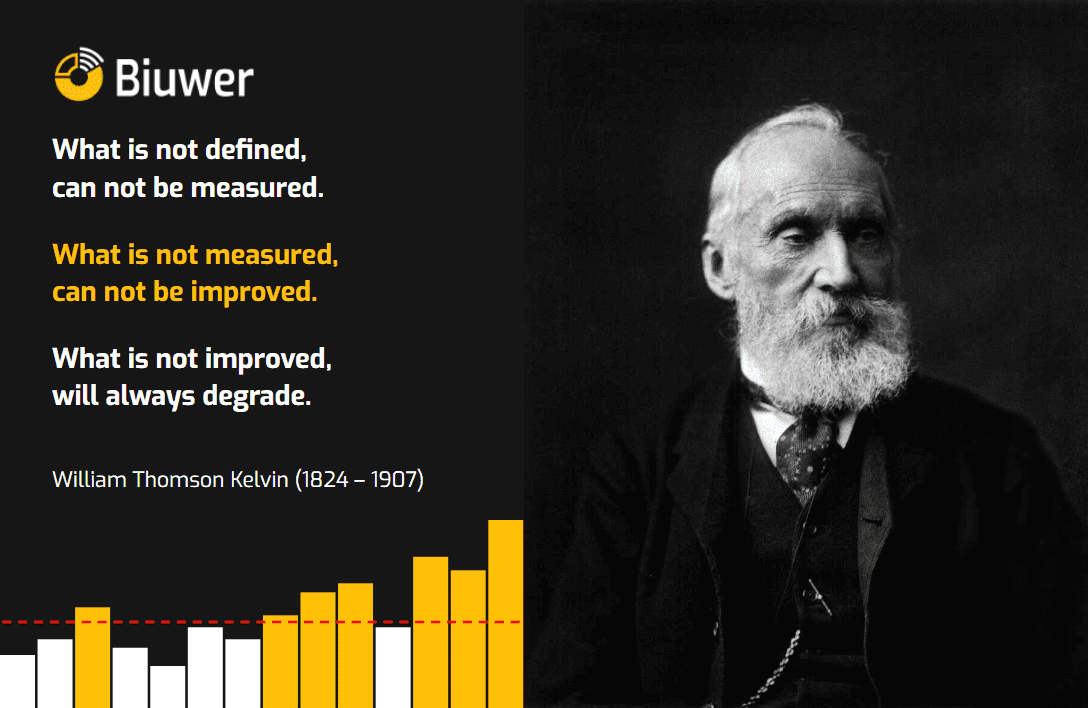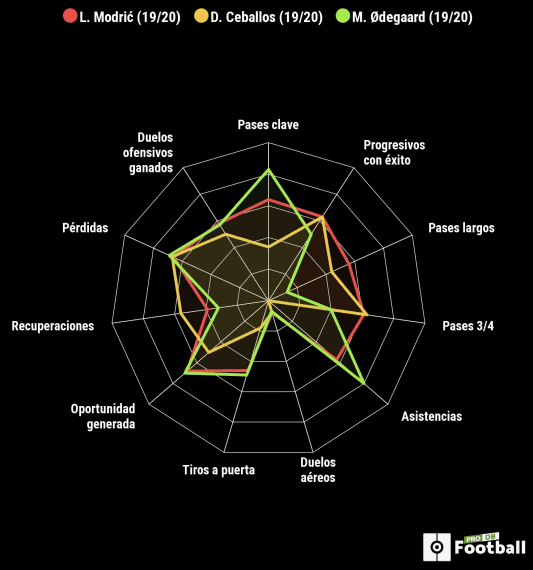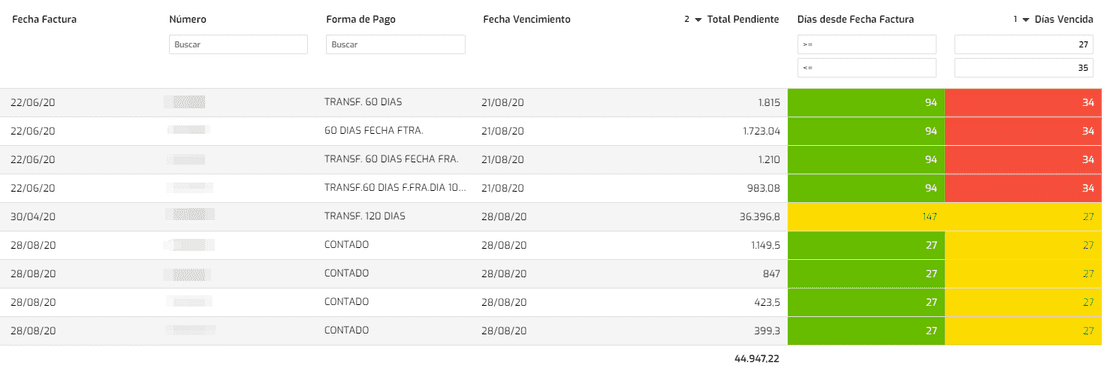What is not measured, cannot be improved. Data analysis use cases
Both in daily life and in the business field, we find many cases in which we do not improve as much as we could, simply because we do not use the right tools or are not sufficiently aware.
The British physicist and mathematician, William Thomson Kelvin, among his statements, left us a phrase as revealing as the following: “What is not defined cannot be measured. What is not measured, cannot be improved. What is not improved, is always degraded”.

Thomson's words make a lot of sense if we consider the importance of knowing the state of the data and parameters in order to establish objectives, strategies, make decisions and, in this way, cover everything that is involved in being in charge. Or what is the same, data without analysis, lose all their value.
And if it is so obvious that what is not measured cannot be managed, why today there are still so many companies and administrations (public and private) that have this subject pending?
Little by little, companies are becoming aware of the importance of this issue and thanks to the use of platforms such as Biuwer, they achieve a comprehensive management that allows them to make decisions taking into account their strengths and weaknesses, without limitations of space or time (wherever and whenever).
Throughout this article we are going to explain some examples of measurable aspects that surround both the daily and business environment.
Everyday Area
Health context
Focusing on the pandemic caused by the coronavirus COVID-19 that has seriously affected the whole world, the measurement of the data has, among other purposes, to advance in the diagnosis and the knowledge of the disease evolution. The massive analysis of the clinical data will improve the assistance and preventive response, through the development of predictive tools, capable of personalizing the treatment lines, optimizing the management of assistance resources, identifying risk factors or recognizing new symptoms.
In a more generalized context, data on consumption and environmental habits can be taken, for example, to predict possible future diseases, thanks to measurement. As well as having greater control over health spending or any clinical process of the patients.
Sport context
Data analysis provides valuable information to sports clubs and they are increasingly aware of this.
Being Baseball the pioneer sport in using Big Data to optimize its results, these tools mean today, in many other sport disciplines, improvements not only in the results at a general level, but also in the performance of the athletes at an individual level.
Money Ball is a film played by Brad Pitt and Jonah Hill, which tells the story of a baseball team that applies its statistical knowledge to hire players and create a new game strategy called Sabermetrics, or SABRmetrics, which consists of the empirical analysis of baseball, especially the measurement and collection of activity statistics that happen during baseball games.

But this also happens in other sports such as soccer. The Spanish company BeSoccer is specialized precisely in the collection, storage and analysis of game statistics, the results, all the actions that occur in each game and all the sporting and social attributes of the players. Its specialized product in soccer data analysis, Pro Football DB, not only offers complete statistics, but also helps with specialized reports, for example, in the transfer market, with player comparisons.

The Spanish company Blinkfire Analytics covers another example specialized in the world of sport, and it is the analysis of the performance of advertising and the audiences that brands achieve, according to their impact on Social Networks (followers, growth rates, etc.), according to different digital channels and, especially, the impact that the different contents have in order to value the advertising investment and the associated contracts. Among the many use cases offered on their platform, there is this analysis of overlap between followers in a given social network between two teams.

For all these reasons, data analysis is representing a revolution for professional sport, to which it offers great possibilities for improvement.
Business Area
Customer collection management
A frequent case of use in companies is to carry out the collection management helping the data analysis in connection with the data stored in the ERP (Enterprise Resource Planning). We are going to be interested in carrying out aging trackings of our customer’s invoices according to their date of emission and their due date, in order to manage in advance with the customers collections actions and to minimize the risk of possible non-payments.
There are frequent situations such as having overdue invoices due to a simple oblivion or a lack of accounting on the part of the customer, with the consequent losses that this can mean for the company. It is advisable to carry out collection management proactively, acting regularly in advance and using tools that allow us to communicate with customers in a simple way by detecting situations of non-payment.
Conditionally formatted reports with traffic light color codes help us focus visually on which invoices are up to date and which are not, as the following example shows.

Price optimization to maximize profitability
Whatever your sector or the type of company you work for, in all companies there is space for improvement in order to establish the optimum prices for the products and services marketed.
There are cases in which it has simply not been calculated how much it costs to manufacture or market a product or service, and the prices we have set are those that we subjectively understand that customers are willing to pay, without applying a commercial margin to the cost price.
It is advisable to calculate as accurately as possible how much it costs to produce a unit of product or service. Once this information is known, a pricing policy can be established, which must be planned based on certain objectives and for this purpose, operating costs, the market or competitors, among others, must be taken into account.
The establishment of objectives must be carried out within a strategic framework, which takes into account the operational aspects and also the aims pursued by the company, in order to:
- Maximize profits
- Promote certain products or services
- To reach a profitability objective
- To position oneself in a market
Store location optimization
Finding the best location for a new store is another example of pain in the neck for company managers.
There are many factors to take into account when making this type of decision and a data analysis platform can help a lot by visualizing on a map, the different data that enter the equation, at different geographical levels (provinces, cities, neighborhoods, ...). For example:
- Population density
- Socioeconomic level by zones
- Location of other own stores
- Location of competitors' stores
- Other POIs (Points of Interest)
The decision can be further simplified if, in addition to adequately displaying all the geographic information involved in interactive maps, we include them in Dashboards with the rest of the related data to make the decision.
Making the information easily interpretable can help us, not only to make the decision of the initial location of the stores, but also to make performance evaluations of these stores over time, and to continue making business decisions that apply in each moment.
Budget control
Any company that carries out an adequate economic-financial management, has an annual budget in which it details the income and expense items foreseen in each month. In order to keep an adequate budget control, it is advisable to carry out a periodical data analysis, typically every month, in which we measure the execution of the annual budget, from the total value to a breakdown by items.
In this analysis, both positive and negative deviations in income and expenses are usually detected, which will give sufficiently detailed information to address business decisions, such as:
- Increase investment
- Increase sales
- Reduce unnecessary expenses
- Adjust prices
The revision and evaluation of the historical data of previous years must be usually taken into account to set the budget for the following year, as well as the guidelines that the company intends to carry out. In other words, keeping an adequate budget control, periodically comparing the real execution of income and expenses, over the execution foreseen in the budget, makes it easier to achieve the objectives set for each year and also to prepare the following budgets.
In short
In conclusion, it is important that decision making, in any context, becomes based on data and not on subjective opinions; this will eliminate bottlenecks and improve performance within companies.
If you don't know where to start, we, the Biuwer team, offer you a Free Quick Start Package with which to help you answer all your questions and make the leap to Business Intelligence with confidence.
If on the contrary, you already know the benefits that data analytics has for business growth and the achievement of objectives in your company, and you have any questions, don't stay behind and contact us now!